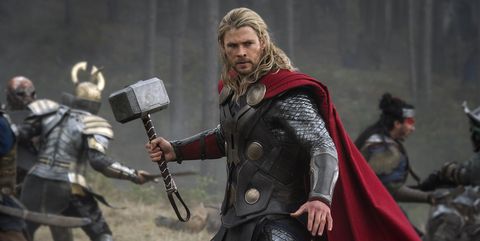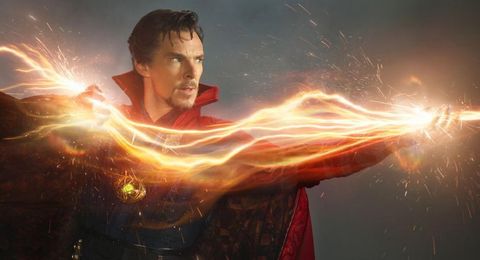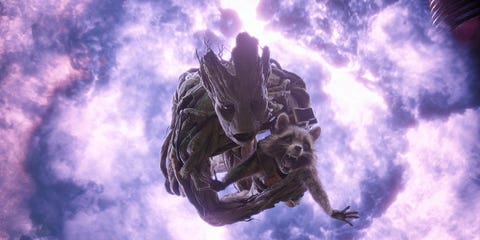RIGHT AROUND THE time my three-year-old son started having behavioral problems—kicking, hitting, biting—at daycare, I stupidly took him to the comic-book store for the first time.
That’s when, rifling through back issues of Batman, I realized that my favorite childhood superhero was kind of an asshole. Even though the Bat vows never to kill anyone, he does do almost everything I was trying to teach my son not to—using violence to solve problems, holding in his emotions, and employing an elderly butler my wife and I clearly couldn’t afford.
Regardless, I bought my son a few books that day, and I told him that it’s all pretend. His behavior did not improve—maybe because I was too late. Fifteen or so years ago, superhero worship was a subculture confined to those dusty comic-book stores, Comic-Cons, and other geek gatherings. Now it’s every where. Credit the Marvel Cinematic Universe, the money-amassing empire that started with Iron Man in 2008. Since then, the MCU has kaboomed into 27 movies and five TV shows and brought words like Groot, Mjolnir, and Thanos into the average guy’s lexicon.
And it is guys who are watching these films. “The whole tone and tenor of these movies skews male,” says Paul Dergarabedian, senior media analyst for Comscore. For the 21 superhero movies released since 2016, men bought about 59 percent of the tickets, reports Comscore. And there’s no endgame in sight. This year, DC’s The Batman swoops into theaters March 4, Doctor Strange in the Multiverse of Madness comes out May 6, Thor: Love and Thunder lands July 8, and Black Panther: Wakanda Forever debuts November 11.
As one dad up against seemingly invincible forces, I pulled a Tony Stark:
I took charge. Up until the end of 2021, the last superhero movie I had seen was 2012’s The Dark Knight Rises. To catchup, I watched 24 superhero films in 23 days. And what started as a marathon prescreening session to see if any of them were appropriate for my son turned into an epiphany: Maybe superhero movies aren’t suited for kids—but maybe they aren’t great for grown-ups, either.
THE AVERAGE SUPERHERO movie has 41 acts of violence per hour, according to a 2020 study in the journal Cureus. More surprisingly, the “good” guys committed 23 of those violent acts, while the baddies issued 18.
Fighting, shouting, impulsivity—maybe my son likes superheroes because they’re grown-up three-year-olds? I ran this by Robert Olympia, M.D., a pediatrician and the lead researcher on the Cureus study. “I think so,” he says. “A lot of these superheroes were children exposed to violence. I think a lot of it has to do with living [it] out or maybe even justifying it as an adult. That’s why I think a lot of adults relate to superheroes as well.”
Based on their studies, Dr. Olympia and his colleagues concluded that the best thing parents can do is watch superhero movies with their kids and talk them through the consequences of bad behavior. So, in the case of Thor: The Dark World, I’d simply explain to my son that it’s totally not okay to sweep-kick your sibling—and then I’d interject that roughly 80 more times throughout the movie.
Although this approach assumes that I know what the hell I’m talking about. While there have been no studies conducted on the effects of violence in superhero movies on men, Dr. Olympia says, “I’m almost 100 percent sure that this affects adults the same as it affects children.” Meaning, my judgment about what’s right and wrong might be tinged by how wildly entertaining I find these films. I needed to figure out if my bullshit detector was J.A.R.V.I.S.-calibrated enough before I could ever help my son sort through what makes a “hero.”
TONY STARK’S FAIL-UPWARD stubbornness, Star-Lord’s prove-himself mentality, Captain America’s at-all-costs mindset, T’Challa’s “I never yielded!”—superheroes largely share one trait: ego. “There’s no sense of atonement or consequences for betrayal, violence, or, like, ‘Oh, hey, remember when I killed all those people before?’” says Kara Kvaran, Ph.D., a professor of women’s studies at the University of Akron who has researched superhero movies. “That’s so counter to reality that it’s very frustrating.”
Even as the Avengers form and the team attempts to work together, they are often thwarted by their own ego-driven manipulations—frequently in the name of “protection,” says Kenneth S. Michniewicz, Ph.D., an assistant professor in the department of psychology at Muhlenberg College, who researches gender stereotypes. (Son, it’s okay to lie, but only if you’re trying to trick your friends into signing the Sokovia Accords.)
So if superheroes are violent, narcissistic, half-apologetic, go-it-alone liars, what makes them so compelling? Kvaran argues it’s the myth of self-sacrifice—something I respected about Batman in my youth: that he alone solved problems for others. It’s a common “hero” trait.
Stark tinkers until he dies from his egotism, leaving a wife and child behind. Thor punishes himself until he becomes borderline alcoholic. Batman actually lives a torturous double life of self-isolation. “We see this in fitness culture; we see it in sports culture,” says Kvaran. “Play through the pain. Take the punishment. That’s how you prove your masculinity.” You see it passed on in fatherhood culture, too. My son is tough—he’ll figure all this out on his own.
“Oftentimes the self-sacrifice storyline exists because these men can’t imagine anyone else being capable of solving this problem or coming up with a different solution, or they’re unwilling to reach out and ask for help,” Kvaran says. And who wouldn’t—in this age of political turmoil, superstorms, and plague—want to be reassured that there’s a quick fix?
There are, however, exceptions to all this bad behavior. The MCU is not Hydra, after all. There are positive actions and relationships—and the genre is undergoing an evolution.
DOCTOR STRANGE (2016) stands as the most un-Marvel movie in the whole MCU. Though the film begins with another sports-car-driving egomaniac, Dr. Stephen Strange goes on to dismantle almost every stereotype about what makes a hero and a man.
Strange, determined to rehabilitate himself from a hand injury that’s left him powerless, trains under the Ancient One, who tells him: “Silence your ego and your power will rise.” Only when Strange relents does his relic—a source of power outside his control—find him. Through his transformation, he makes amends and asks for something most heroes don’t think they need: help.
Strange lacks the superhuman size of Thor or the Hulk, the tech of T’Challa, and the invincibility of Captain Marvel. In the final battle against his foe Kaecilius, Strange spends much of it defending himself and puts the world back together. And when our hero faces the totally psychedelic Dormammu, he wins by forever submitting.
“He’s a different kind of hero,” says Sean Parson, Ph.D., an associate professor of politics at Northern Arizona University who coedited the essay collection Superheroes and Masculinity. “He has to solve his problems through other ways, which makes him have a more complicated masculinity, too. In fact, physical power is not his forte at all. His cape hits people more than him.”
Parson says there are other positive exceptions beyond Strange. There’s the vulnerability and intimacy between Vision and Wanda. There’s the torment and regret of Spider-Man hurting those around him. There’s the tear-inducing, ride-or-die relationship between Groot and Rocket Raccoon. Last year’s Shang-Chi and the Legend of the Ten Rings focused on family and friendship. Eternals tackled gender and race. Whether Strange continues to grow in Multiverse is up to its new director, Sam Raimi.
I’ll watch the first Doctor Strange film with my son in a few years, no doubt, and hopefully a few more films if superhero movies continue to evolve. (I will also tell him that I’d rather have a Flerken claw out my eye than rewatch Age of Ultron.) And I’ll tell him that superhero movies are complicated.
As Kvaran says: “Superheroes represent the best we can possibly be a shumans—they choose to use their power to try to make the world around them better. That is incredibly inspiring: I want to be powerful enough to have a powerful impact on my community.”
But that message is often corrupted by ego, stoicism, and competitiveness. Of course, collaborating, reaching out, and creating new institutions don’t make for movie magic. (“Like, Tony Stark goes to a board meeting and gets everybody in Flint, Michigan, clean water is not a fun movie to watch,” Kvaran says.) We watch movies to escape the gear grinding of real life, relieve stress, and maybe, maybe take away something about the human condition.
That last part—watching movies with a more critical eye and a more empathetic heart—is what I hope I can pass on to my son. I can ask him the same questions I’m asking myself as we watch. Perhaps not 41 times an hour, but certainly more than none.
His behavioral issues did dissipate, by the way, when we started packing him more snacks. Maybe what Bruce Wayne really needs is a cheese stick.










Comments are closed.